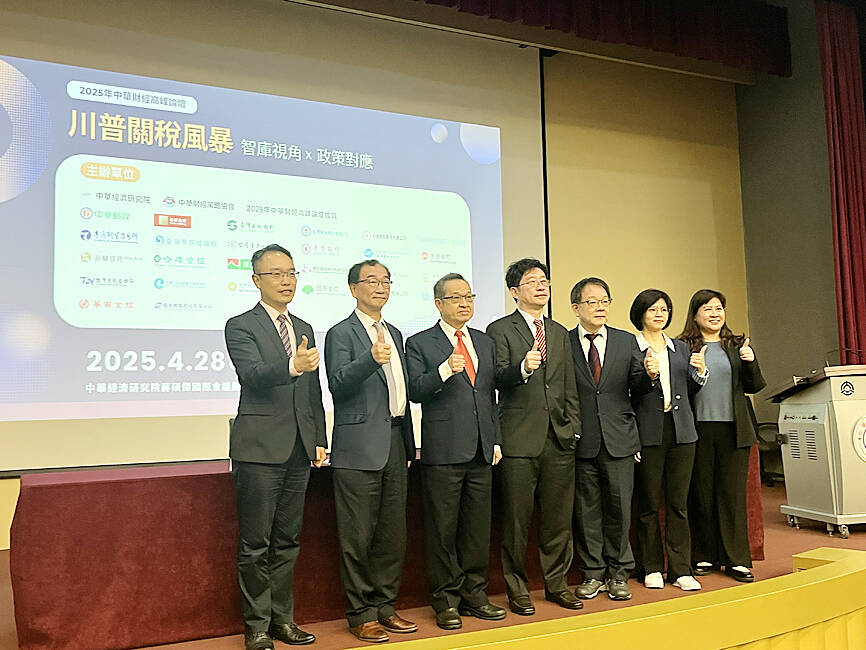Taiwan should seek a tariff exemption for its information and communications technology (ICT) products during negotiations with the US, as they constitute about 70 percent of the nation’s exports to the US, the Chung-Hua Institution for Economic Research (CIER) said yesterday.
The impact of tariffs on Taiwan’s ICT industry could be enormous, as it would not be easy for Taiwanese suppliers to relocate production to the US anytime soon, CIER president Lien Hsien-ming (連賢明) told a forum in Taipei about US President Donald Trump’s tariff policies.
Taiwan faces a 32 percent “reciprocal” tariff that Trump imposed on April 2 before announcing a 90-day pause on April 9.

Photo: Hsu Tzu-ling, Taipei Times
Taipei and Washington held their first meeting on April 11, with the Office of Trade Negotiations saying that tariffs, trade barriers and export controls were discussed.
President William Lai (賴清德) described the process of the first round of talks as “smooth,” while the Executive Yuan said it expected another round of negotiations to begin soon.
Lien said it would not be wise for Taiwan to take tough action in retaliation for Trump’s tariffs, given that Taiwan’s economy is much smaller than that of the US.
He said he expected Trump to set a “reciprocal” tariff of 15 to 20 percent on goods made in Taiwan.
Yang Shu-fei (楊書菲), deputy head of CIER’s Regional Development Study Center, told the forum that Taiwan could help the US rebuild its manufacturing sector by sharing its experience in developing science parks and industrial zones.
Yang said such parks and zones could create jobs and upgrade manufacturing in the US, while Washington could use its roughly 300 free-trade zones to trade goods made by Taiwanese manufacturers and help reduce its trade deficit.
The US-Taiwan trade deficit rose from US$47.8 billion to US$73.9 billion last year, driven by a surge in US imports, CIER said.
Due to the potential US tariffs, Taiwan’s economic growth could slow to 1.66 percent this year, the institute predicted.
The Directorate-General of Budget, Accounting and Statistics in late February forecast a 3.14 percent growth for this year, after the economy grew 4.59 percent last year.

In Italy’s storied gold-making hubs, jewelers are reworking their designs to trim gold content as they race to blunt the effect of record prices and appeal to shoppers watching their budgets. Gold prices hit a record high on Thursday, surging near US$5,600 an ounce, more than double a year ago as geopolitical concerns and jitters over trade pushed investors toward the safe-haven asset. The rally is putting undue pressure on small artisans as they face mounting demands from customers, including international brands, to produce cheaper items, from signature pieces to wedding rings, according to interviews with four independent jewelers in Italy’s main

Japanese Prime Minister Sanae Takaichi has talked up the benefits of a weaker yen in a campaign speech, adopting a tone at odds with her finance ministry, which has refused to rule out any options to counter excessive foreign exchange volatility. Takaichi later softened her stance, saying she did not have a preference for the yen’s direction. “People say the weak yen is bad right now, but for export industries, it’s a major opportunity,” Takaichi said on Saturday at a rally for Liberal Democratic Party candidate Daishiro Yamagiwa in Kanagawa Prefecture ahead of a snap election on Sunday. “Whether it’s selling food or

CONCERNS: Tech companies investing in AI businesses that purchase their products have raised questions among investors that they are artificially propping up demand Nvidia Corp chief executive officer Jensen Huang (黃仁勳) on Saturday said that the company would be participating in OpenAI’s latest funding round, describing it as potentially “the largest investment we’ve ever made.” “We will invest a great deal of money,” Huang told reporters while visiting Taipei. “I believe in OpenAI. The work that they do is incredible. They’re one of the most consequential companies of our time.” Huang did not say exactly how much Nvidia might contribute, but described the investment as “huge.” “Let Sam announce how much he’s going to raise — it’s for him to decide,” Huang said, referring to OpenAI

The global server market is expected to grow 12.8 percent annually this year, with artificial intelligence (AI) servers projected to account for 16.5 percent, driven by continued investment in AI infrastructure by major cloud service providers (CSPs), market researcher TrendForce Corp (集邦科技) said yesterday. Global AI server shipments this year are expected to increase 28 percent year-on-year to more than 2.7 million units, driven by sustained demand from CSPs and government sovereign cloud projects, TrendForce analyst Frank Kung (龔明德) told the Taipei Times. Demand for GPU-based AI servers, including Nvidia Corp’s GB and Vera Rubin rack systems, is expected to remain high,